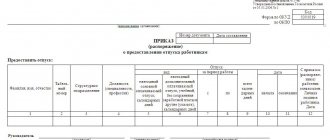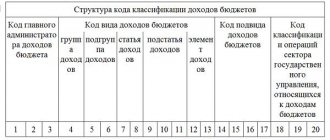Inspection and inspection - these two concepts are often confused. The first involves a visual examination and consent, excluding customs inspection and the study of real estate, territory, the owner of which is a legal entity, and the second procedure is forced and more detailed, but carried out while maintaining the integrity of things. There are other differences between the two phenomena. What is the difference between an inspection and a search? You will find the answer to these questions in our article.
What is the difference between an inspection and a search?
Article 55 Tax period
1. A tax period is understood as a calendar year or another period of time in relation to individual taxes, at the end of which the tax base is determined and the amount of tax payable is calculated.
A tax period may consist of one or more reporting periods. 2. If an organization was created after the beginning of the calendar year, the first tax period for it is the period from the date of its creation to the end of the given year. In this case, the day of creation of the organization is recognized as the day of its state registration. When an organization is created on a day falling within the time period from December 1 to December 31, the first tax period for it is the period from the date of creation to the end of the calendar year following the year of creation. The rules provided for by this paragraph do not apply to determining the first tax period for corporate income tax for foreign organizations that independently recognized themselves as tax residents of the Russian Federation in the manner established by this Code, and whose activities on the date of such recognition did not lead to the formation of a permanent establishment in the Russian Federation .
3.
Article 55. Tax period
If an organization was liquidated (reorganized) before the end of the calendar year, the last tax period for it is the period from the beginning of this year until the day the liquidation (reorganization) was completed. If an organization created after the beginning of a calendar year is liquidated (reorganized) before the end of this year, the tax period for it is the period from the date of creation to the day of liquidation (reorganization). If an organization was created on a day falling within the time period from December 1 to December 31 of the current calendar year, and was liquidated (reorganized) before the end of the calendar year following the year of creation, the tax period for it is the period from the date of creation to the day of liquidation ( reorganization) of this organization.
The rules provided for in this paragraph do not apply to organizations from which one or more organizations are separated or joined. 4. The rules provided for in paragraphs 2 and 3 of this article do not apply to those taxes for which the tax period is established as a calendar month or quarter. In such cases, when creating, liquidating, or reorganizing an organization, changes in individual tax periods are made in agreement with the tax authority at the place of registration of the taxpayer.
5. Repealed 6. If a tax resident of the Russian Federation independently recognizes itself as a foreign organization, the activities of which on the date of such recognition did not lead to the formation of a permanent representative office in the Russian Federation, the determination of the first tax period for corporate income tax is carried out in the manner established by this paragraph. If a foreign organization independently recognized itself as a tax resident of the Russian Federation from January 1 of the calendar year in which it submitted an application to recognize itself as a tax resident of the Russian Federation, the first tax period for corporate income tax for it is the period from January 1 of the calendar year in which the said application has been submitted by the end of this calendar year. If a foreign organization independently recognized itself as a tax resident of the Russian Federation from the date of submission to the tax authority of an application for recognition of itself as a tax resident of the Russian Federation, the first tax period for corporate income tax for it is the period from the date of submission of the specified application to the tax authority until the end of the calendar year , in which the said statement is presented. Moreover, if the application of a foreign organization, specified in paragraph three of this paragraph, to recognize itself as a tax resident of the Russian Federation is submitted on a day falling on the period from December 1 to December 31, the first tax period for corporate income tax for it is the period from the date of submission of the said application to the tax authority before the end of the calendar year following the year in which the said application was submitted.
1. A tax period is understood as a calendar year or another period of time in relation to individual taxes, at the end of which the tax base is determined and the amount of tax payable is calculated. A tax period may consist of one or more reporting periods.
2. If an organization was created after the beginning of the calendar year, the first tax period for it is the period from the date of its creation to the end of the given year. In this case, the day of creation of the organization is recognized as the day of its state registration.
When an organization is created on a day falling within the time period from December 1 to December 31, the first tax period for it is the period from the date of creation to the end of the calendar year following the year of creation.
The rules provided for by this paragraph do not apply to determining the first tax period for corporate income tax for foreign organizations that independently recognized themselves as tax residents of the Russian Federation in the manner established by this Code, and whose activities on the date of such recognition did not lead to the formation of a permanent establishment in the Russian Federation .
Key elements of tax and their characteristics: tax base and rate
In accordance with the norms of paragraph 1 of Art. 53 of the Tax Code of the Russian Federation, the appropriate base is legitimately understood as a monetary, physical or other significant characteristic of the tax element that the object is. The base is calculated in correlation with another mandatory element - the tax rate, which is an estimated indicator of the amount of tax payments, correlated with the unit of measurement of the corresponding base. Russian tax rates are most often expressed as a percentage.
The tax base can be:
- characteristics of the object of taxation in the monetary aspect;
- characteristics of the taxable object in terms of its physical indicators (for example, area).
In addition, the base can be established based on other characteristics, such as, in particular, the region of location of the taxable object, the specifics of the commercial segment in which it is used, the level of productivity if the corresponding object is a component of fixed assets.
Legal entities are required to calculate the base on the basis of accounting registers or alternative sources that allow documenting information about taxable objects or information related to them (clause 1 of Article 54 of the Tax Code of the Russian Federation).
Entrepreneurs, as well as notaries and lawyers, can determine the tax base without using accounting registers, but using forms for recording income and expenses in the manner determined by the Ministry of Finance of Russia (clause 2 of Article 54 of the Tax Code of the Russian Federation). In practice, this means maintaining a book of income and expenses by these entities.
Individuals, in turn, calculate the tax base based on acquired data on tax objects, as well as relying on their own accounting of the relevant objects, in any form (clause 3 of Article 54 of the Tax Code of the Russian Federation). In practice, the work of determining the tax base for individuals is usually carried out by the Federal Tax Service.
Tax agents, for example employers, must work with the tax base based on the same rules of law that regulate the activities of legal entities, individual entrepreneurs, notaries and lawyers (clause 4 of article 54 of the Tax Code of the Russian Federation).
Change in the Tax Code: tax period
If an organization was liquidated (reorganized) before the end of the calendar year, the last tax period for it is the period from the beginning of this year until the day the liquidation (reorganization) was completed.
If an organization created after the beginning of a calendar year is liquidated (reorganized) before the end of this year, the tax period for it is the period from the date of creation to the day of liquidation (reorganization).
If an organization was created on a day falling within the time period from December 1 to December 31 of the current calendar year, and was liquidated (reorganized) before the end of the calendar year following the year of creation, the tax period for it is the period from the date of creation to the day of liquidation ( reorganization) of this organization.
The rules provided for in this paragraph do not apply to organizations from which one or more organizations are separated or joined.
4. The rules provided for in paragraphs 2 and 3 of this article do not apply to those taxes for which the tax period is established as a calendar month or quarter. In such cases, when creating, liquidating, or reorganizing an organization, changes in individual tax periods are made in agreement with the tax authority at the place of registration of the taxpayer.
5. Lost power
6. If a tax resident of the Russian Federation independently recognizes itself as a foreign organization, the activities of which on the date of such recognition did not lead to the formation of a permanent representative office in the Russian Federation, the determination of the first tax period for corporate income tax is carried out in the manner established by this paragraph.
If a foreign organization independently recognized itself as a tax resident of the Russian Federation from January 1 of the calendar year in which it submitted an application to recognize itself as a tax resident of the Russian Federation, the first tax period for corporate income tax for it is the period from January 1 of the calendar year in which the said application has been submitted by the end of this calendar year.
If a foreign organization independently recognized itself as a tax resident of the Russian Federation from the date of submission to the tax authority of an application for recognition of itself as a tax resident of the Russian Federation, the first tax period for corporate income tax for it is the period from the date of submission of the specified application to the tax authority until the end of the calendar year , in which the said statement is presented.
Moreover, if the application of a foreign organization, specified in paragraph three of this paragraph, to recognize itself as a tax resident of the Russian Federation is submitted on a day falling on the period from December 1 to December 31, the first tax period for corporate income tax for it is the period from the date of submission of the said application to the tax authority before the end of the calendar year following the year in which the said application was submitted.
1. A tax period is understood as a calendar year or another period of time in relation to individual taxes, at the end of which the tax base is determined and the amount of tax payable is calculated. A tax period may consist of one or more reporting periods.
2. If an organization was created after the beginning of the calendar year, the first tax period for it is the period from the date of its creation to the end of the given year. In this case, the day of creation of the organization is recognized as the day of its state registration.
When an organization is created on a day falling within the time period from December 1 to December 31, the first tax period for it is the period from the date of creation to the end of the calendar year following the year of creation.
The rules provided for by this paragraph do not apply to determining the first tax period for corporate income tax for foreign organizations that independently recognized themselves as tax residents of the Russian Federation in the manner established by this Code, and whose activities on the date of such recognition did not lead to the formation of a permanent establishment in the Russian Federation .
The object of taxation as a mandatory element of tax: what are its features
Based on the norms contained in paragraph 1 of Art. 38 of the Tax Code of the Russian Federation, the object of taxation is legitimately understood as having monetary, quantitative, as well as physical characteristics:
- sale of goods, work or services;
- property;
- profit;
- revenue;
- expenses;
- other circumstances within the jurisdiction of tax laws.
The noted categories can become the object of tax only in cases where their presence on the part of the payer presupposes the emergence of legal obligations on his part to make appropriate payments to the budget.
The Tax Code of the Russian Federation also states that all taxes correlate with individual objects established in accordance with the norms of Part 2 and the provisions of Art. 38 Tax Code of the Russian Federation.
The tax object can include both movable and immovable property (Clause 2, Article 38 of the Tax Code of the Russian Federation, Articles 128, 130 of the Civil Code of the Russian Federation). As for goods, it can be any property that is sold by the taxpayer or is subject to sale. Work based on the provisions of paragraph 4 of Art. 38 of the Tax Code of the Russian Federation is an activity accompanied by results in some material terms. Services, following the logic of clause 5 of Art. 38 of the Tax Code of the Russian Federation is an activity that does not have results in material terms. Moreover, it can be implemented to meet the needs of someone else - individuals or organizations. Services, in turn, are consumed in the process of providing them.
Revenue traditionally refers to income excluding expenses. They can also be an independent object of taxes, for example, under the simplified tax system. If you take them into account, a profit is formed.
An example of other circumstances within the jurisdiction of tax law may be the operation of an enterprise on UTII. The size of revenue, expenses, property, and the rate of sales do not matter with imputed taxes - the company one way or another pays a fixed contribution to the state.
The rules for determining the tax period have been clarified
If an organization was liquidated (reorganized) before the end of the calendar year, the last tax period for it is the period from the beginning of this year until the day the liquidation (reorganization) was completed.
If an organization created after the beginning of a calendar year is liquidated (reorganized) before the end of this year, the tax period for it is the period from the date of creation to the day of liquidation (reorganization).
If an organization was created on a day falling within the time period from December 1 to December 31 of the current calendar year, and was liquidated (reorganized) before the end of the calendar year following the year of creation, the tax period for it is the period from the date of creation to the day of liquidation ( reorganization) of this organization.
The rules provided for in this paragraph do not apply to organizations from which one or more organizations are separated or joined.
4. The rules provided for in paragraphs 2 and 3 of this article do not apply to those taxes for which the tax period is established as a calendar month or quarter. In such cases, when creating, liquidating, or reorganizing an organization, changes in individual tax periods are made in agreement with the tax authority at the place of registration of the taxpayer.
5. The clause has lost force since January 1, 2007 - Federal Law of July 27, 2006 N 137-FZ.
6. If a tax resident of the Russian Federation independently recognizes itself as a foreign organization, the activities of which on the date of such recognition did not lead to the formation of a permanent representative office in the Russian Federation, the determination of the first tax period for corporate income tax is carried out in the manner established by this paragraph.
If a foreign organization independently recognized itself as a tax resident of the Russian Federation from January 1 of the calendar year in which it submitted an application to recognize itself as a tax resident of the Russian Federation, the first tax period for corporate income tax for it is the period from January 1 of the calendar year in which the said application has been submitted by the end of this calendar year.
If a foreign organization independently recognized itself as a tax resident of the Russian Federation from the date of submission to the tax authority of an application for recognition of itself as a tax resident of the Russian Federation, the first tax period for corporate income tax for it is the period from the date of submission of the specified application to the tax authority until the end of the calendar year , in which the said statement is presented.
Moreover, if the application of a foreign organization, specified in paragraph three of this paragraph, to recognize itself as a tax resident of the Russian Federation is submitted on a day falling on the period from December 1 to December 31, the first tax period for corporate income tax for it is the period from the date of submission of the said application to the tax authority before the end of the calendar year following the year in which the said application was submitted.
Tax payment procedure
Based on the norms of paragraph 1 of Art. 58 of the Tax Code of the Russian Federation, taxes can be paid either in a single amount or in several transactions in accordance with the procedure established by law. In this case, it is assumed that the taxpayer or agent will transfer the required amounts to the budget on time (clause 2 of Article 58 of the Tax Code of the Russian Federation).
In cases provided for by the Tax Code of the Russian Federation, the payer may have an obligation to transfer advance payments to the budget. They must also be transferred to the state on time, otherwise the Federal Tax Service has the right to charge penalties on the corresponding amounts. However, missing the deadline for making advance payments cannot be grounds for bringing the subject of tax payment to responsibility (Clause 3 of Article 58 of the Tax Code of the Russian Federation).
The tax can be transferred to the budget in cash or non-cash. If an individual taxpayer does not have the opportunity to make a payment through a financial institution, he can make a payment through the cash desk of the municipal administration or Russian Post (Clause 4 of Article 58 of the Tax Code of the Russian Federation). These structures are required to:
- accept funds from the taxpayer without charging a commission and correctly transfer them to the budget;
- record in the accounting documents the fact of accepting funds from a specific taxpayer;
- issue the taxpayer a receipt confirming the acceptance of funds from him;
- submit to the Federal Tax Service documents certifying the transfer by taxpayers of funds for the purpose of paying taxes and confirming their transfer to the state.
The municipal administration or Russian Post subsequently transfers the funds received from the payer to the accounts of the Federal Tax Service in the Federal Treasury.
So, the timing, as well as the procedure for payment, are mandatory elements of taxes. However, there is another important aspect - the procedure for calculating the relevant deadlines, as well as those associated with other legally significant actions of taxpayers.
Commentary on Article 55 of the Tax Code of the Russian Federation
The commented article establishes the concept of a tax period and reporting periods, and also establishes the rules for determining the first tax period for organizations that were created after the beginning or at the end of the tax period, as well as for organizations that were liquidated (reorganized) before the end of the tax period.
The special rules established by Article 55 of the Tax Code of the Russian Federation apply only to organizations. They do not apply to individual entrepreneurs.
This is indicated in the Letter of the Ministry of Finance of Russia dated July 27, 2011 N 03-11-11/195.
The date of occurrence of the obligation to pay tax is the date of the end of the tax period for taxes, the tax period for which consists of several reporting periods, based on the results of which advance payments are made; when deciding on the qualification of claims, the end dates of reporting periods are also taken into account.
This legal position is enshrined in the Resolution of the Presidium of the Supreme Arbitration Court of the Russian Federation dated April 24, 2012 N 17331/11.
For the tax period, consider the following example.
The first reporting period for an organization created in December 2015 is the period from the date of registration of the organization to March 31, 2021. Accordingly, if an organization calculates monthly advance payments based on the profit actually received, then the first reporting period in this case will be the period from the date of registration of the organization to January 31, 2021.
The first tax period for corporate income tax for an organization created in December 2015 will be the period from the date of registration of the organization to December 31, 2021.
Federal Law dated February 15, 2016 N 32-FZ added provisions to the commented article on determining the first tax period for corporate income tax when independently recognizing itself as a foreign organization, the activities of which on the date of such recognition did not lead to the formation of a permanent representative office in the Russian Federation, tax authorities a resident of the Russian Federation determines the first tax period for corporate income tax in accordance with the procedure established by this paragraph.
If a foreign organization independently recognized itself as a tax resident of the Russian Federation from January 1 of the calendar year in which it submitted an application to recognize itself as a tax resident of the Russian Federation, the first tax period for corporate income tax for it is the period from January 1 of the calendar year in which the said application has been submitted by the end of this calendar year.
If a foreign organization independently recognized itself as a tax resident of the Russian Federation from the date of submission to the tax authority of an application for recognition of itself as a tax resident of the Russian Federation, the first tax period for corporate income tax for it is the period from the date of submission of the specified application to the tax authority until the end of the calendar year , in which the said statement is presented.
Moreover, if the application of a foreign organization, specified in paragraph three of this paragraph, to recognize itself as a tax resident of the Russian Federation is submitted on a day falling on the period from December 1 to December 31, the first tax period for corporate income tax for it is the period from the date of submission of the said application to the tax authority before the end of the calendar year following the year in which the said application was submitted.
Tax calculation procedure
The next mandatory element of tax is the calculation procedure established by law. If you follow the norms of paragraph 1 of Art. 52 of the Tax Code of the Russian Federation, the subject of tax payment in the general case must calculate taxes on his own based on the available data on the base, rates and benefits. However, in a number of cases, the obligation to calculate the payment may be assigned to the Federal Tax Service or tax agents (clause 2 of Article 52 of the Tax Code of the Russian Federation). If this work is performed by tax authorities, then they also have an obligation to timely send a notification to the taxpayer.
Now let’s move on to considering the timing of tax transfer to the budget and the procedure for paying it to the state. These elements of the tax, as we noted at the beginning of the article, are mandatory.





